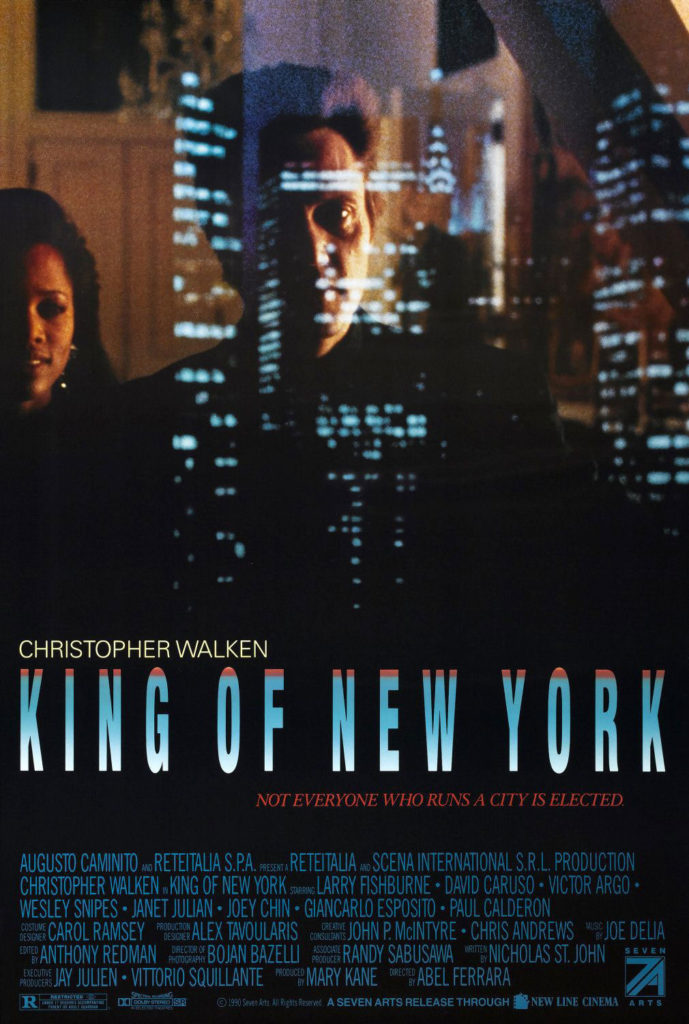I read recently that Christopher Walken may be getting his own cooking show. It was on the internet, so it must be true. Fact or fiction, that got me thinking about Mr. Walken, and when considering his career arc, those thoughts inevitably turned to Abel Ferrara’s 1990 crime flick, King of New York.
Walken stars as Frank White, a crime lord just released from Sing Sing. It’s never said what he had been convicted of or how long he was away, but when he gets out, Frank wastes little time getting back to shenanigans. Frank’s release marks the beginning of a murderous crime spree, seemingly targeting every organized crime figure in the city that dares to defy Frank’s will. In that, the story is rather conventional, but that’s where any appearance to typical gangster films end.
King of New York is a violent film. There are no protagonists. This is a film littered with one-dimensional killers and prop women. The motivations for such barbaric behavior are never made all that clear. Sure, gangsters commit violence in service of their profit margins in real life, but nothing seems that honest in this movie. Rather, the men that Frank White surrounds himself with, and the men he  makes his enemies, never seem to have any coherent thoughts of consequences or of anything that happens beyond the barrels of their guns. If real criminals acted like this, it would only be a matter of months, maybe even weeks, before they all killed themselves off, and the streets would be safe for decent folk.
makes his enemies, never seem to have any coherent thoughts of consequences or of anything that happens beyond the barrels of their guns. If real criminals acted like this, it would only be a matter of months, maybe even weeks, before they all killed themselves off, and the streets would be safe for decent folk.
Having an unbelievable story is not the greatest sin that a film can commit, of course. Complete ridiculousness and absurdity can, in fact, make for great cinema. King of New York, however, feels like a joke. Only, it isn’t supposed to be one. It looks like Abel Ferrara tried to tell an earnest story of the violent unraveling of a master criminal, but, for half the film anyway, I felt like I was watching one of the dumbest films I’ve ever seen. It wasn’t until the lengthy final act, when all the extraneous shit has been excised (poorly) from the film, that it takes a turn from being very bad to being good. I got whiplash from how quickly, and to such an extent, the film changed for the better. Without spoiling the plot too much, when Frank finally starts getting shot at, that’s the moment when I finally felt interested in anything that was happening on screen. It was not enough to save the film.
None of this is the fault of the cast. Most of the performances were good. The worst of the bunch was merely able. That’s not bad.
Walken was pure Walken. There’s no sense in describing his performance, trying to pick out nuances and stuff like that. It’s impossible to see the character for the performer when it comes to Christopher Walken, but that doesn’t mean he wasn’t good. In a film full of flat characters, he was the only one with any amount of depth. It’s a good thing he was the star, then.
While the rest of the cast had to play one-dimensional characters, at least they played them well. The standout among Walken’s co-stars was Laurence Fishburne as Jimmy Jump. His character was over the top, always threatening to go too far. But Fishburne played Jimmy Jump like a pro. Just when a viewer may be about to give up, just when Fishburne appears to be hamming it up, he pulls back. In considering Jimmy Jump, I can’t help but think that this is the type of part that Eric Roberts used to get around the same time and promptly mutilate. No such worries with Fishburne. It’s just the right amount of grit, the right amount of cartoonishness, and the right amount of urban ferocity.
There are some women in the film, but porn has got nothing on how King of New York objectifies the female gender. When they’re not walking around with their breasts hanging out, they’re modeling the latest in lingerie and providing sexual favors to all the big bad men with the big bad guns. Of all aspects of the film, this was by far the most ridiculous. At least some of them got in on all the shooting.
The major problem with the film, though, is in Abel Ferrara’s direction. I understand he wasn’t dealing with a glut of resources when it came to making this film, but, without mincing words, it’s poorly shot. The entire film has an aesthetic that I can only describe as early 90’s television chic. The lighting is harsh, the shadows are stark, and everything looks like it was filmed at a tiny Fringe Festival theater in the East Village. His definition of storytelling seems to be to fill in all the slow spots with a little violence, and everything will work itself out. Characters make important decisions off camera, leading to little that happens on camera making much sense. The plot is totally opaque. What little character development there is fails completely, as none of the people that populate this movie engender any sort of empathy. Every time someone died, I felt like I, as a viewer, had just won a prize.
Having seen more than one Abel Ferrara film in my life, I have to come to the conclusion that he sees the world far differently than most people. In other hands, it could be refreshing to be exposed to storytelling from such skewed perspectives. From Ferrara, it feels like adult violence crossed with a hormonal boy’s fantasies.
